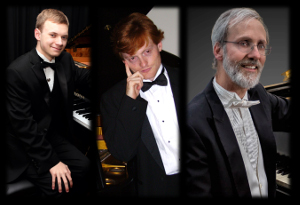When Long Leaf Opera’s Randolph Umberger and Benjamin Keaton decided to open their season with Gian Carlo Menotti’s The Consul, they had no idea how bitterly timely their choice would be. On Thursday September 27, less than three weeks after the attack on New York and Washington, this grim Kafkaesque opera about border bureaucracy, written on the eve of the Cold War and looking back on the refugee tragedies of the 30s and WW II, took on a whole new relevance. No, it was not a “pleasant” evening, but CVNC readers still have a chance to purchase tickets for Saturday and Sunday performances – and they should.
The main plot of The Consul is the story of freedom fighter John Morel (sung by baritone Rick Piersall), pursued and already wounded by the secret police (bass, Michael Ventura) and forced to flee his unnamed country. His wife, Magda (soprano Olive McKrell), attempts to cross the border with her sickly infant and elderly mother-in-law (mezzo-soprano Jane Kline) to join him. Most of the action takes place in the also unnamed consulate where Magda and five refugees-representing an endless procession-each with his or her own compelling story, desperately attempt to obtain entry visas. They all try to see the Consul himself, who never appears, to present their plight. Whether the refugees’ destination will ultimately prove to be a paradise or hell, they must get by The Secretary (mezzo-soprano Mary Gayle Greene), the consulate’s bureaucratic Cerberus, who demands ever more documents, as opposed to the soporific sweets Virgil’s Aeneas got by with when he visited the underworld. While Magda’s plight is the centerpiece of the opera, the stories of the five other refugees provide both dramatic and symbolic depth to the scenario. Lest one think that Menotti was targeting any particular country or ethnic group, Magda, the other refugees and John’s underground comrade Assan (tenor Robert Weston Williams) bear a collection of surnames that reads like the roster of a UN committee. Even The Foreign Woman (soprano Catherine Marie Alderman), who cannot speak or understand the language of the country she’s in nor the one she’s trying to flee to, sings her role in Italian but is in no other way identified as Italian. The other refugees, The Magician (tenor William Chamberlain), Anna Gomez (soprano Linda Lister), Vera Boronel (mezzo soprano Sharon Stith) and Mr. Kofner (baritone Jean-Roland Lafond) have both diverse personalities and dramatic functions that create variety within the numbing monotony of the Consulate’s vestibule.
All that being said as introduction, what about the production? Long Leaf, now in its third season, has been undeservedly limping along with scant audiences-last night’s opener saw only about a third of the Carolina Theater’s seats filled. Although they still have a long way to go to get their pick-up orchestra to play together and in tune, Long Leaf has mounted consistently excellent productions of English language opera with superior singers. Last night was no exception. The singing was excellent for the most part, especially McKrell, Kline and Greene. In her one solo scene, Greene eloquently reveals The Secretary’s emotional conflict between her job and her natural compassion. Chamberlain as The Magician provided one of the few moments of comic relief as he scurries around the consulate waiting room, doing limp magic tricks and proclaiming that artists are citizens of the world and shouldn’t have to be bothered with documents. A seasoned veteran of several prestigious stages, Chamberlain deserves a return invitation to the Triangle both for his sheer vocal prowess as well as his acting ability.
Less successful as actors were Piersall as John Sorel, who kept forgetting to limp after being wounded in the leg, and Ventura. We have watched Ventura’s progress for several years now as he has grown into his basso profundo. Unfortunately, he always seems uncomfortable on stage, a more serious impediment than merely poor acting. His expressionless woodenness, however, strangely fits the emotional and spiritual poverty of his “Gestapo” model.
The Consul is certainly within the tradition of Italian verismo opera, so the seedier scenery the better. Menotti, however, provides long instrumental interludes between the six scenes alternating between the Sorel’s kitchen and the consulate. What to do with the frequent scene changes posed a problem, and Umberger’s solution actually worked rather well. In a darkened-but not blacked out-stage, two dancers (Jessica Knight and Walker and Stephen Marquez), representing John and Magda, offered a balletic interpretation of both their bond and their tragic trap, as stagehands, looking appropriately like moving men, change the scenery and props. Providing a synopsis of the plot is a valuable addition in an opera playbill. But the one provided for The Consul , with its run-on sentences and agreement problems, lacked the most basic editing. Since Long Leaf is a cooperative effort with NCCU, one of the English professors could have provided a more readable text.
You’ve heard the Mozart Requiem before. Do you really want to buck the crowds piling into Duke Chapel? An equally important way to commemorate not only our own tragedy, but also the epic plight of those who flee totalitarianism and yearn for freedom, is to attend The Consul. Further performances take place on Saturday evening and Sunday afternoon.











